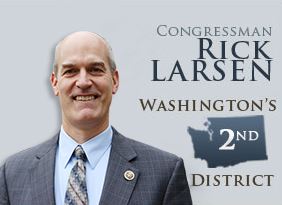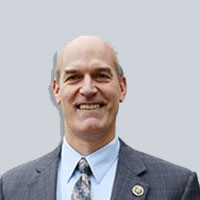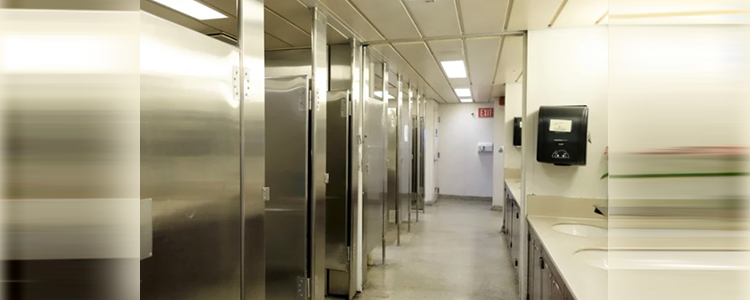— from Ingrid Stegemoeller, Rep. Larsen’s Office —
 Rep. Rick Larsen, WA-02, today voted in favor of a bipartisan spending bill that makes major investments in the environment and clean energy, as well as other investments in jobs and opportunity for which he has long advocated. The FY2016 Omnibus Appropriations Act provides funding for all federal agencies through September 2016, in line with the bipartisan budget agreement that Congress passed in October.
Rep. Rick Larsen, WA-02, today voted in favor of a bipartisan spending bill that makes major investments in the environment and clean energy, as well as other investments in jobs and opportunity for which he has long advocated. The FY2016 Omnibus Appropriations Act provides funding for all federal agencies through September 2016, in line with the bipartisan budget agreement that Congress passed in October.
“In today’s world of political extremes, it is sometimes hard to see the work of legislative compromise actually happen. More often than not, Congress produces legislation that is an all or nothing affair. But legislating as our country’s founders envisioned requires compromise, when both parties of a negotiation get some of the things they want and lose some of the things they want. That is how citizens expect Congress to operate – to find solutions that, on balance, advance the priorities of the American people.
“And that is how the Democratic leadership operated with the spending bill that I voted for and Congress passed today, by negotiating hard and successfully to secure landmark victories for our environment and for our growing clean energy economy.
“The Land and Water Conservation Fund is back in action with a nearly 50 percent funding boost. This hugely successful conservation fund has helped preserve open spaces throughout the Pacific Northwest for 50 years. Communities can once again rely on the fund to protect public lands and waters like Ebey’s Reserve, Chuckanut Bay and the Wild Sky Wilderness.
“The iconic Northwest salmon serves as an important cultural symbol and environmental linchpin. That is why I pushed to invest in the Pacific Coastal Salmon Recovery Fund, which has successfully supported improvements to hundreds of thousands of acres of salmon habitat. I am pleased that the fund will continue to restore critical salmon habitat in the coming year.
“Northwest Washington is already a leader when it comes to renewable energy, and provisions in this bill will propel us forward with major investments in solar and wind technology. Following the historic climate change agreement in Paris, our country must take action lead the way on renewable energy. We made a big down payment today for a clean energy economy and jobs.
“I understand some people are unhappy about lifting the ban on crude oil. I would rather see the ban stay in place too. But the many victories for our environment and clean energy in this bill illustrate the hard work of legislative compromise,” Larsen said.
Highlights of the Omnibus Appropriations Act for Northwest Washington
A full summary of the bill is available here.
Protecting the Environment and Creating a Clean Energy Economy
- Land and Water Conservation Fund (LWCF): $450 million, an increase of $144 million over FY2015 levels. Congress let the LWCF expire earlier this year, and Larsen has pushed to reauthorize the successful conservation program. The omnibus authorizes the program for three years.
- Pacific Coastal Salmon Recovery Fund: $65 million, which is the funding level that Larsen requested. He has led efforts to secure funding for this critical habitat restoration program.
- Energy Efficiency & Renewable Energy: $2.1 billion, which is $136 million more than FY2015 levels. This office leads federal efforts to develop and advance clean energy technology.
- Advanced Research Projects Agency-Energy (ARPA-E): $291 million, which is $11 million more than FY2015 levels. ARPA-E provides funding and assistance for emerging clean energy technology ideas.
- Investment Tax Credit: Extends this tax credit for solar installations for an additional five years, with a gradual decrease of the credit over that time frame.
- Production Tax Credit: Extends this tax credit for wind production for five years, with a gradual decrease of the credit over that time frame.
- U.S. Army Corps of Engineers: $6 billion, which is $535 million more than FY2015 levels. Of these funds, $1.2 billion is for Harbor Maintenance Trust Fund projects.
Investing in Our Transportation Infrastructure
- Transportation Investment Generating Economic Recovery (TIGER) grant program: $500 million. TIGER grants fund major transportation investment projects. The bill also includes language reminding the Secretary of Transportation to consider worthy transportation projects in suburban areas, which is similar to a bill that Larsen introduced called TIGER CUBS to modify the program to direct more of these funds to small and mid-sized cities like those throughout Northwest Washington.
Supporting Small Business Job Growth
- State Trade and Export Promotion (STEP) program: $18 million. The STEP program helps small businesses trying to overcome hurdles to exporting. Larsen and Rep. Dave Reichert, WA-08, introduced a bill to reauthorize STEP. Larsen requested continued STEP funding in the Consolidated Appropriations Act.
Investing in Education and Training
- Impact Aid: $1.3 billion, which is an increase of $23 million from 2015 Impact Aid provides payments to school districts that serve large numbers of military families and Indian tribes, including La Conner, Marysville and Oak Harbor. Larsen has long championed Impact Aid in Congress and pushed successfully to improve the program in the education reform bill that Congress passed earlier this month.
- Pell Grants: $22.5 billion. Pell Grants help students with financial need attend college. The bill also increases the maximum Pell Grant award by $140 to $5,915.
- Head Start: $9.2 billion, which is $570 million more than the FY2015 level. Larsen asked for full funding for Head Start in FY2016 to support the centers in Northwest Washington that give our youngest students the opportunity to get ready for kindergarten and lifelong learning.
- Child Care Development Block Grant: $2.8 billion, which is $326 million more than FY2015 levels.
- Corporation for National and Community Service: $1.1 billion, an increase of $40 million over FY2015 levels. CNCS supports service programs like AmeriCorps, including those in Northwest Washington.
- Workforce Innovation and Opportunity Act (WIOA) programs: $2.7 billion, which is an $86 million increase over FY2015 levels. WIOA is the largest source of federal funding for job training and adult education. Larsen voted for WIOA last year.
Investing in Healthy and Safe Communities
- Local law enforcement support
o Byrne-JAG grants: $347.1 million.
o COPS: $212 million.
- Violence Against Women Act programs: $480 million, which is $50 million more than FY2015 levels. Larsen helped lead efforts to reauthorize the Violence Against Women Act in 2013.
- Legal Services Corporation (LSC): $385 million, which is a $10 million increase over FY2015 levels. LSC provides legal assistance to people who may not otherwise be able to afford it.
- National Institutes of Health (NIH): $32.1 billion, a $2 billion increase over FY2015 levels. The NIH funds life-saving medical research at research hospitals and universities, including in the Puget Sound.
- Community Development Block Grants: $3 billion.
**If you are reading theOrcasonian for free, thank your fellow islanders. If you would like to support theOrcasonian CLICK HERE to set your modestly-priced, voluntary subscription. Otherwise, no worries; we’re happy to share with you.**









With all of the millions and billions of dollars being spent, our Veterans and Seniors are left out in the cold. (for some, literally). No Cost of Living Increases! Those who have served their country well will be struggling even more this next year while corporate profits will continue to receive their obscene “encouragement” from our taxes! “Jobs”? No, only jobs Slightly above Minimum Wage that Nobody can live on.
The biggest mistake our Congress is making is to ignore the needs of our Millennials who have No Hope of using the tried and true “work hard, save money, get a house, raise a family, and be a part of the bright future of America. That is gone! Stolen. Given away by a corrupt system of Cronyism. Enough already! Spirit Eagle
I can see that the big mistake we, as a country are making is that of taking away from the young people, the future that their parents and grandparents had of rising above poverty level and creating a better life for their generation!